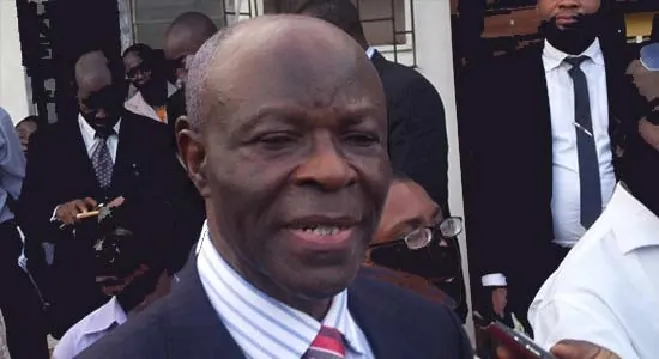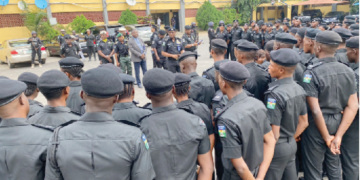The Federal Government has put together 12 Senior Advocates of Nigeria (SAN) to argue its case filed by 11 Peoples Democratic Party (PDP) governors against the emergency rule imposed on Rivers State by President Bola Tinubu.
Former Attorney General of the Federation, Chief Akin Olujinmi (SAN) heads the legal team of the Federal Government.
The other Senior Advocates include Prof. Kanyinsola Ajayi, Jelili Owonikoko, Kehinde Ogunwumiju, Tijani Gazali, Babatunde Obama, Olawale Fapohunda, Olumide Olujinmi, Akinyemi Olujinmi and Ademola Abimbola.
Other lawyers in the team are: Akinsola Olujinmi, Oluwole Ilori, Abdulwahab Abayomi, Mojeed Balogun, Jideuche Ezi and Ramat Tijani.
Recall that President Tinubu had declared a State of Emergency in Rivers State on March 18, 2025, suspending Governor Siminalayi Fubara, Deputy Governor Ngozi Odu, and all elected members of the State House of Assembly for an initial period of six months over prolonged political crisis in the State.
The President appointed Viral Admiral Ibok-ette Ibas (retd.) as the sole administrator to oversee the state’s affairs for the duration of the suspension period.
The National Assembly subsequently ratified the President’s declaration through a voice vote.
The PDP governors sued the Attorney-General of the Federation (AGF) and the National Assembly as 1st and 2nd defendants, respectively, before the Supreme Court.
The plaintiffs are Adamawa, Enugu, Osun, Oyo, Bauchi, Akwa Ibom, Plateau, Delta, Taraba, Zamfara, and Bayelsa State governors.
The governors through their various State’s Attorneys-General in a suit marked SC/CV/329/2025, asked the Supreme Court to determine what authority the President has to suspend a democratically elected state institution and replace it with an unelected one.
They asked the apex court to determine six constitutional questions, including whether the President of Nigeria can lawfully suspend or interfere with the offices of a governor and deputy governor and replace them with an unelected appointee under the guise of a state of emergency proclamation.
They further requested the court to determine whether the Attorney-General’s threat, acting on behalf of the President, to suspend the offices of governors and deputy governors by virtue of such proclamations contravenes the provisions of the 1999 Constitution of the Federal Republic of Nigeria and principles of constitutional federalism.
The plaintiffs also questioned whether the National Assembly could approve a state of emergency proclamation, including suspension of state executives and legislatures, by a simple voice vote rather than the constitutionally required two-thirds majority of all members of each house.
In their reliefs, the plaintiffs sought declarations that: The President cannot lawfully suspend or interfere with the offices of governors and deputy governors or replace them with unelected nominees under a state of emergency.
They argued that the President cannot lawfully suspend a State House of Assembly under such circumstances.
We’ve got the edge. Get real-time reports, breaking scoops, and exclusive angles delivered straight to your phone. Don’t settle for stale news. Join LEADERSHIP NEWS on WhatsApp for 24/7 updates →
Join Our WhatsApp Channel










